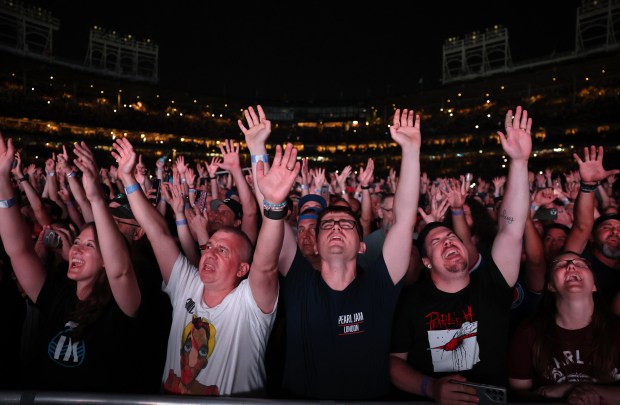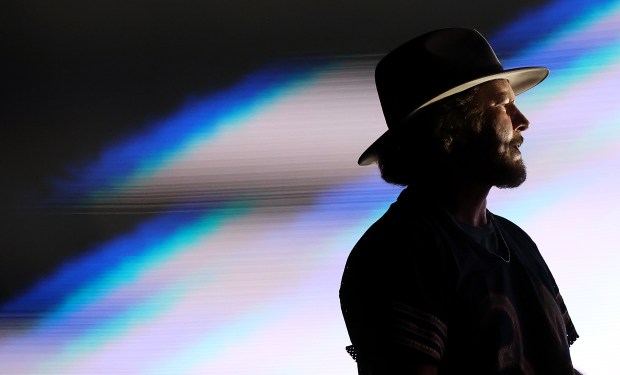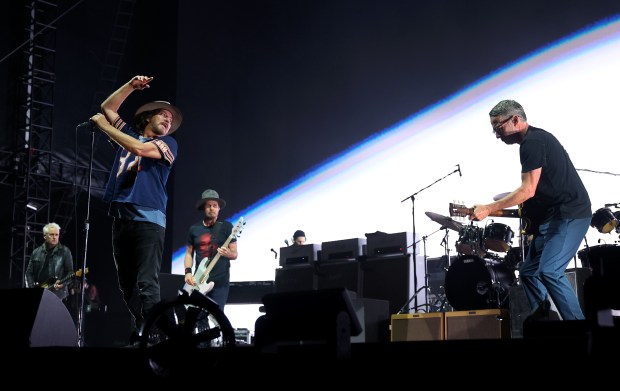At this rate, Pearl Jam might be destined to join a few Cubs immortals and get its own statue outside of Wrigley Field. Returning to the ballpark for the fourth year and first time since 2018, the group opened its two-night stand on Thursday with a 145-minute show packed with fervent emotion, controlled focus and clear undercurrents of resistance.
Something special happens whenever the Seattle-based group plays the Friendly Confines, and vocalist Eddie Vedder knows it. Wearing a fedora and a “34” Walter Payton jersey, the Evanston native mentioned the significance that performing at the venue holds for him and the band. During the encore, Vedder admitted he found it hard to sing due to how overwhelmed he felt.
Though many artists pay lip service to most cities with comparable praise, Vedder’s sentiments reverberated with sincerity. He nearly broke down in tears as he introduced a feisty solo cover of Tom Petty’s “I Won’t Back Down” and said the late icon phoned him from Wrigley Field at what became his final local outing in 2017. Phil Donahue, a recently deceased celebrity with deep Chicago ties, also received a song tribute (“Down”) and humorous anecdote.
Prone to going off on extensive tangents, particularly in front of Chicago crowds, Vedder told a few other stories yet kept his banter brief. It marked a noticeable shift from last September at the first of the band’s two-date run at United Center. There, the chatty singer overshadowed the music at points with an abundance of storytelling, jokes and guest introductions.
Little has changed in the Pearl Jam camp since those arena dates. The biggest news? In April, the Rock & Roll Hall of Famers released their 12th studio album, “Dark Matter.” The streamlined record holds up with a bulk of the group’s strongest fare — a feat that surpasses what a majority of artists at similar phases of their careers typically deliver.
Indeed, what Pearl Jam does as well or better than its contemporaries is age with its core audience. Vedder and company manage to both retain their creative integrity and embrace maturation, a difficult balancing act that on the surface violates unwritten rock ‘n’ roll rules. Whereas countless veterans strive to adopt a youthful sheen and then look silly pretending, Pearl Jam seems content with elder-statesman status.
Call it “dad rock” if you must, even if that slight doesn’t really fit. Pearl Jam continues to ignore the lure of the legacy-act trap. There’s often far more at stake at the quintet’s shows than feel-good nostalgia. Just as importantly, the band knows its fans and itself and stays true to both.
“We are old ourselves,” Vedder announced. Provided the historical context, few in the near-capacity, mostly middle-aged crowd could argue that fact. The singer, too, embodied the march of time via his physicality — motivated and animated as usual, but unable to jump high, swing guitars or run about as he did in not too distant of a past.
In many ways, Vedder’s adjustments mirrored the refinement of his band. Everyone appeared wiser for adapting to their circumstances. For a collective edging closer to its 35th year together — and for perspective, remember we live in a longevity-deprived era where the 10th anniversaries of minor albums are even treated as a big deal — Pearl Jam sounded determined, sharp and locked-down tight. Hungry, even.
Accompanied by regular keyboardist Boom Gaspar and multi-instrumentalist Josh Klinghoffer, the band channeled its energy into direct, dynamic music that placed rage on the backburner and targeted consequential outcomes tied to the here and now. Pearl Jam concerts tend to function as communal catharsis, a wellspring of optimism in the face of daunting odds. Thursday upheld that tradition with a plethora of shared encouragement.

The slow exhale and meditative spiritualism of “Release,” its gravity magnified by dim illumination that allowed the song’s mystical power to dwarf the nearly invisible band. The anthemic uplift and confident affirmation of “Alive,” boosted during its climax by the activation of Wrigley Field’s tower lights. The big-sky openness and soaring promise of “Given to Fly,” its arms-outstretched architecture tailored for welcoming thousands of strangers as friends. Mass experiences, and hopeful in the same persuasive manner that the folksy “Elderly Woman Behind the Counter in a Small Town” proved bittersweet.
Pearl Jam addressed other romantic yearnings in more certain terms. Seated on a stool, Vedder dedicated a solo acoustic version of the self-described “wedding song” “Just Breathe” to a couple celebrating an anniversary. For the forgiveness plea “Won’t Tell,” he plucked a woman out of the audience and sang it with her as a duet. A paean to maintaining steadfast faith in dreams, “Setting Sun” offered the group an opportunity to build up from spare, quiet foundations and react to the rise of Vedder’s grainy baritone.
The band’s superb sense of pacing, rhythm and cohesiveness reflected the subtlety and smarts of its visual treatments. In line with its heritage, Pearl Jam shunned runways and pyrotechnics. It assigned priority to songs, yet used three screens — one center, one located at each of the wings — to display real-time action as well as abstract graphics and cosmos-inspired optics that doubled as secondary lighting elements. Sunspots, calm water, rolling waves, geometrical patterns and spherical arcs all reinforced the more cerebral aspects of the event.
Refraining from issuing any frank sociopolitical statements, Pearl Jam made its points with many of the songs it chose for the set and how it approached them. Following a barbed rendition of “Daughter,” Vedder changed the lyrics to the snippet of Pink Floyd’s “Another Brick in the Wall, Pt. 2” to advocate on behalf of women’s rights and their jurisdiction over their own bodies. Primarily, the group conveyed its intentions via thinly veiled references.
A host of material — the power-pop “U,” the racing “Do the Evolution,” the epic “Immortality” — addressed themes such as self-absorption, blind obedience, privilege, greed and irresponsibility. With Vedder leaning forward and leading the attack from an aggressive knee-bent position, “Why Go” railed against unjust internment. The stun-gun sting of “Dark Matter” took dead aim at demagoguery, intolerance and inequity. The prospect of compromised climates further witnessed the group navigating “Wreckage” and outlining a “State of Love and Trust.”

Anchored by Matt Cameron’s frill-free drumming, Jeff Ament’s guided-missile bass lines and Vedder’s mix of snarls and shivers, standout recent tunes such as the punchy “Scared of Fear” came across as if they stemmed from one of Pearl Jam’s first two indispensable LPs.
The songs received extra jolts of electricity courtesy of Mike McCready. Left to his own devices, the lead guitarist established moods and dictated directions with scorching codas and sensitive fills. He blended tones with reverb, echo, wah-wah and fuzz effects. His left hand pulled, pinched and tapped strings to produce sequences that spoke with blues, punk, soul and garage-rock dialects.
As part of his monster performance, McCready exited the stage and climbed down to the front row. Perched behind his head, his instrument screamed with heady feedback in reply to Vedder’s dare to top prior versions of the oft-stale evergreen “Even Flow.” Challenge accepted. And, as McCready returned to his amplifier stack and finished the solo on his knees, answered and met.
Given the circumstances, it was a night that could only end with the band’s roaring take on Neil Young’s “Rockin’ in the Free World.” Protest disguised as celebration, the classic served as a dire warning and united call for awareness. A telling snapshot of where Pearl Jam stands at this critical juncture in our time.
Bob Gendron is a freelance critic.
Setlist from Wrigley Field Aug. 29:
“Release”
“Of the Girl”
“Elderly Woman Behind the Counter in a Small Town”
“Off He Goes”
“Immortality”
“Given to Fly”
“Why Go”
“Scared of Fear”
“Waiting for Stevie”
“Wreckage”
“Daughter” into “Another Brick in the Wall, Pt. 2” (Pink Floyd cover)
“Down”
“Even Flow”
“U”
“Dark Matter”
“Black”
“Do the Evolution”
“Porch”
Encore
“Just Breathe”
“I Won’t Back Down” (Tom Petty cover)
“State of Love and Trust”
“Won’t Tell”
“Corduroy”
“Setting Sun”
“Alive”
“Rockin’ in the Free World” (Neil Young cover)



